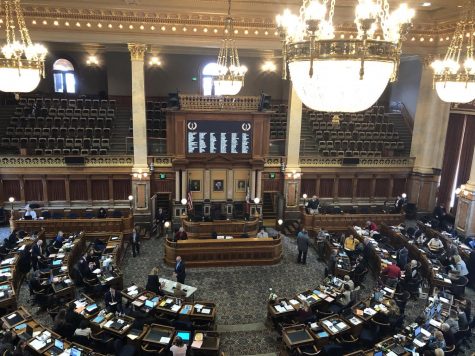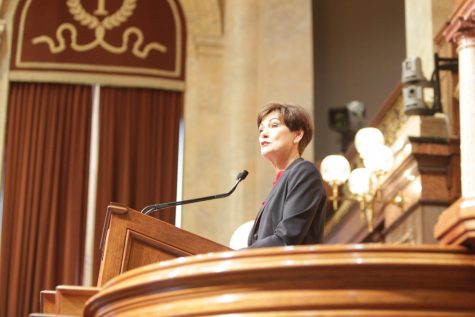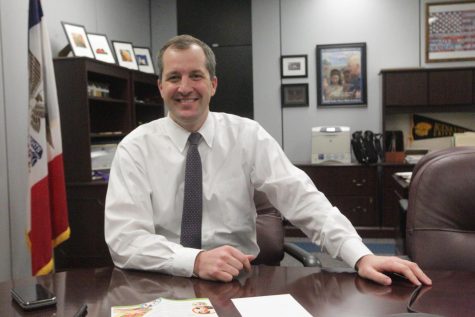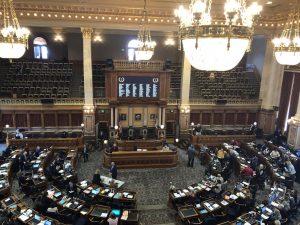Reynolds proposes restoring voting rights to convicted felons in Condition of the State
Reynolds revealed plans for a constitutional amendment to restore felon voting rights in her Condition of the State address.
Julia Shanahan. Iowa Gov. Kim Reynolds waves on the Iowa House floor after she finished her Condition of the State address Jan. 15.
January 15, 2019
UPDATED with interview remarks from Gov. Kim Reynolds
DES MOINES — Redemption and renewed opportunities for people convicted of crimes emerged as a prominent theme in Gov. Kim Reynolds’ first Condition of the State address as elected governor on the morning of Jan. 15.
Reynolds announced a constitutional amendment to restore the voting rights of Iowans convicted of felons to a standing ovation from the audience in the Iowa House of Representatives.
She highlighted apprenticeship programs in state prisons as improving the employment prospects of prison inmates and unveiled a new home-building program at Newton Correctional Facility.
“There are few things as powerful as the joy of someone who got a second chance and found their purpose,” Reynolds said.
Currently, Iowa has one of the most restrictive felon voting-rights policies in the U.S. It persists as one of two states that bar voting rights indefinitely after a felony conviction.
An amendment to the Iowa Constitution is the most permanent option to restore voting rights. The Iowa Constitution contains a provision banning anyone convicted of an “infamous crime” from voting, which has been interpreted as a felony conviction by the Iowa Supreme Court.
There are few things as powerful as the joy of someone who got a second chance and found their purpose. — Gov. Kim Reynolds
A constitutional amendment would involve redefining the language of the “infamous crimes” provision and would require the approval of two successive Legislatures plus approval by the voters in a ballot referendum.
If accomplished, Reynolds’ proposed amendment could grant voting participation to the approximately 52,000 Iowans convicted of felonies.
“Our founders gave us a process to amend the Constitution, should the passage of time change our view,” Reynolds said. “Let’s begin that process now. I believe Iowans recognize the power of redemption; let’s put this issue in their hands.”
Reynolds said she has also used her executive power of clemency to restore voting rights 88 times since taking office.
She shared that she was inspired by one of the 88 Iowans with re-established voting rights, who approached her at her grandson’s basketball game in Waukee.
“I had restored his rights, and he wanted to tell me, in person, how much it meant to him. How, when he stepped into the voting booth, he felt a dignity that had been missing, even after leaving prison,” Reynolds said. “I don’t think this man and others like him who have completed their sentences should have to wait for my say or any future governor’s say before they get that dignity back.”
RELATED: Iowa’s road to restoring the right to vote to felons
Another faster, yet more temporary, option than a constitutional amendment could include an executive order by Reynolds, as former Gov. Tom Vilsack did in 2005. His action granted the right to vote again to about 115,000 felons before it was rescinded by then-Gov. Terry Branstad in 2011.
Senate Minority Leader Janet Petersen said that although she was pleased the governor addressed the subject, she believes voting restoration could be achieved faster through other means than a constitutional amendment.
“As we approach the the 100th year of women’s right to vote, I believe it’s time to expand voting rights not only with felons but also with automatic voting registration,” she said.
Reynolds also recognized victims of crimes are not mentioned in the Iowa Constitution and proposed an additional amendment to establish their rights, as 36 other states have done.
Senate Judiciary Committee Chair Brad Zaun said a constitutional amendment is something he takes very seriously. He said last year, the Judiciary Committee worked on Marsy’s law, which involves notifying victims when their perpetrator is released.
“There were some concerns about public safety, and that’s the reason we couldn’t move it out,” he said. “I do support what they’re trying to accomplish, and that’s allowing the victims to know when the person that offended them is released.”
In an interview with The Daily Iowan, Reynolds outlined the origins for felon voting-rights reform.
“I believe in second chances,” Reynolds said. “I’m a recipient of second chances, and I think it’s important to give felons a chance to restore voting rights, but we don’t want to lose sight of the victims.”
She said she wanted to propose a constitutional amendment instead of using an executive order like Vilsack because it would be more permanent. The soonest her proposal could be implemented would be 2022.
“The problem with executive order is that it can change from governor to governor, and I think this would allow the people to really weigh in,” Reynolds said.





















